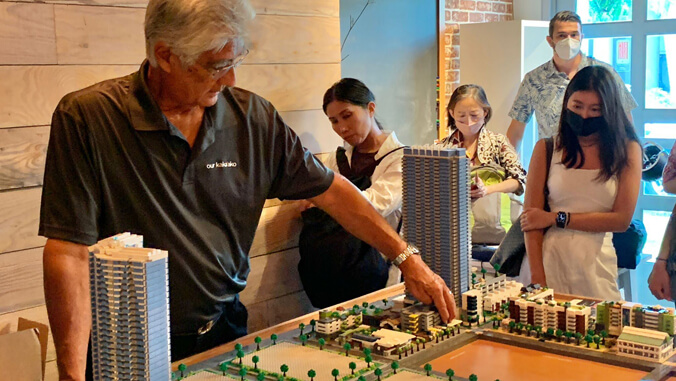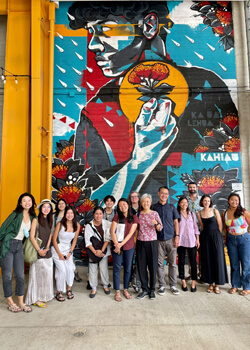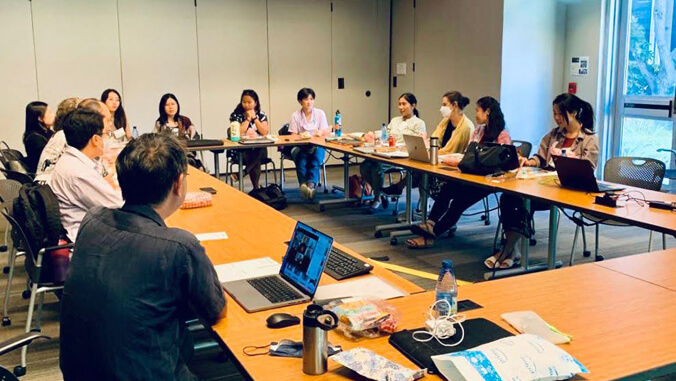
University of Hawaiʻi at Mānoa students had the opportunity to explore sustainability solutions with policy makers, researchers and practitioners from around the world during the Associated Pacific Rim University (APRU) Sustainable Cities & Landscapes Conference 2022 hosted in September by the Institute for Sustainability and Resilience. The 5th annual conference of the Sustainable Cities and Landscape Hub focused on answers to the big social, urban and ecological questions of our time.
The core of the conference were 11 working groups that gave participants the chance to explore collaborative, multidisciplinary research with international colleagues. The groups allowed UH Mānoa students from the undergraduate to PhD candidate levels, to see the unique challenges of different geographic areas and the diverse approaches to address those challenges as well as opportunities to further their interests in sustainability.
The working groups

- Water and Wastewater
- Civic Engagement and Community Design
- Smart Cities
- Vulnerable, Resilient and Climate Change Justice Communities
- Future Energy Landscapes
- Landscape and Human Health
- Sustainable Urban Design
- Urban-Rural Linkages
- Urban Landscape Biodiversity
- Children, Youth and Environment
- Pandemics, Humanitarian Emergencies and Health
Kammie-Dominique Tavares, a first year PhD student in the College of Social Sciences Department of Urban and Regional Planning (DURP), was both a participant and volunteer. She took part in the Vulnerable Resilient and Climate Justice Communities working group.
“I am new to DURP and the social sciences in general, so this was an awesome way to be immersed in the field,” Tavares said. “I was able to exchange stories with people from around the world who have similar interests and learn about the projects they’re working on and compare it to those in Hawaiʻi. Although we work in locations physically far apart from each other, having the same passion for our communities made me feel close and connected to others, and that was a really special experience.”
Genesis Leong, a DURP master’s student who is also pursuing a graduate certificate in disaster management and humanitarian assistance and working as a public information officer for the UH Mānoa Center on Disability Studies, was also particularly interested in the Vulnerable Resilient and Climate Justice Communities working group. She found the brainstorming with like-minded individuals very encouraging as they explored how their universities and organizations could collaborate on research articles, grants and supporting students through their studies.
“I’m particularly interested in disasters and climate change impacts on marginalized groups like people with disabilities, Native Hawaiians and other Indigenous groups,” she said. “I’ve also been inspired by the APRU conference to explore different ways to bring together people from across the UH campus to meet and further discuss climate resilience approaches. There are so many amazing projects on-campus focused on this topic and so many untapped potential opportunities to further our efforts.”

In addition to the working group sessions, the conference provided participants with a variety of tours and site visit opportunities around Honolulu including the ʻIolani Palace, Bishop Museum, UH Community Design Center and Waikīkī.
“No matter where we are in the world, the wicked problems (i.e., climate change, clean and accessible water, energy usage, climate justice, etc.) continue to impact us and where we live,” said Leong. “And in order to really tackle global problems, we need conferences like this to discuss, learn and help each other.”
More on APRU
APRU is a network of leading universities linking the Americas, Asia, and Australasia that brings together thought leaders, researchers, and policy-makers to exchange ideas and collaborate on practical solutions to the challenges of the 21st century. The three post-pandemic strategic priorities are providing a neutral platform for high-level policy dialogue, taking action on climate change, and supporting diversity, inclusion and minorities.
UH Mānoa is one of 60 international and 11 U.S. university members of APRU that represent 19 economies of the Pacific Rim.


